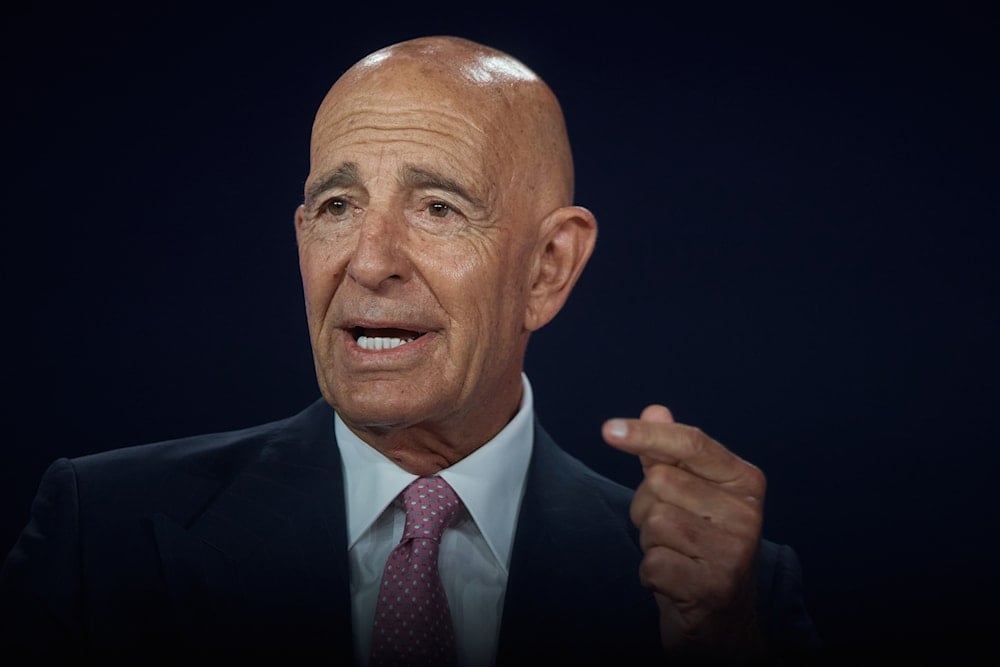Barrack pushes US agenda: Disarm Hezbollah, rebrand Syria policy
Tom Barrack calls on Washington to lift sanctions on Syria and pressure Lebanon to disarm its Resistance, framing US meddling as “peace".
-

US Ambassador to Turkey Tom Barrack speaks during the Concordia Annual Summit in New York, Wednesday, Sept. 24, 2025 (AP)
US Ambassador Tom Barrack has called for the repeal of US sanctions on Syria and for the disarmament of Hezbollah in Lebanon, describing both moves as essential to consolidating what he perceives as the Trump administration’s post-Gaza peace strategy for the Middle East.
In a policy essay published on October 13, titled “Syria and Lebanon Are the Next Pieces for Levant Peace,” Barrack said the ceasefire and captive release celebrated at the Sharm el-Sheikh summit marked “a defining moment” in what he described as a regional diplomacy, signaling a shift from coercion toward reconstruction and cooperation under President Donald J. Trump’s twenty-point plan for renewal.
“Under President Trump’s leadership, decades of fear and stagnation are giving way to purpose and optimism,” Barrack wrote, adding that what began as a truce in Gaza had evolved into “a renewed mosaic of partnership.”
Syria: From punishment to partnership
Barrack urged Congress to follow the Senate in repealing the Caesar Syria Civilian Protection Act, arguing that sanctions imposed in 2019 had achieved their moral purpose but now hinder the country’s recovery following the inauguration of a new Syrian government last December.
“The Caesar Act served its purpose against the previous regime, but it now suffocates a nation seeking to rebuild,” he wrote.
He praised President Trump’s May 13 announcement in Riyadh of his intent to lift most sanctions, formalized by executive order on June 30, describing the move as a historic pivot: “From coercion to cooperation.”
According to Barrack, repealing the act is a strategic step that would unlock investment in Syria’s power grids, water systems, schools, and hospitals. He cited appeals by Syrian Christian clerics who warned that continued sanctions were accelerating the exodus of Christians from the country.
“Repeal is not appeasement; it is realism,” Barrack wrote, contending that economic revitalization would prove “the surest antidote to extremism.”
Lebanon: The next frontier
Turning to Lebanon, Barrack said that regional stability also depends on the disarmament of Hezbollah’s military power and advancing border discussions with "Israel".
He argued that previous US- and UN-brokered truces had failed because Beirut remained politically paralyzed and unable to enforce the principle of “one country, one military.” Hezbollah’s influence within the Lebanese Cabinet, he said, has prevented adoption of Washington’s proposed “One More Try” plan, a phased disarmament framework backed by France and Gulf states.
“As Damascus stabilizes, Hezbollah grows more isolated,” Barrack claimed, adding that "Israel" may act unilaterally if Beirut does not "assert state control."
He threatened that a renewed war could prompt the postponement of Lebanon’s May 2026 elections under the pretext of national security, risking civil unrest and institutional breakdown.
Regional vision under Trump
Barrack framed his appeal as part of a broader regional realignment driven by President Trump’s “peace by prosperity” doctrine. He said the Gaza ceasefire, alongside moves toward Arab-Israeli economic integration, had created “the first genuine consensus in a century” across Arab, Muslim, and Western nations.
With the Resistance in the region "weakened", Barrack continued, and "Saudi Arabia nearing formal accession to the Abraham Accords, the Levant now stands at the threshold of alignment."
He added that the newly appointed US Ambassador to Lebanon, Michel Issa, would arrive in Beirut next month to help guide Lebanese authorities through what he called “a defining choice, to seize renewal or remain mired in decline.”
“Now is the time for Lebanon to act,” Barrack concluded.
Wider context
Barrack’s remarks come at a time when "Israel’s" actions on multiple fronts threaten to undercut the very vision of peace he champions. Despite the Sharm el-Sheikh ceasefire agreement, "Israel" has continued to bomb Gaza, with brutal airstrikes reported across Khan Younis and Rafah amid claims of “security violations” by the Israeli occupation forces.
In Lebanon, Israeli aggression has become a near-daily occurrence, as Israeli strikes target residential areas, often resulting in civilian casualties and displacement.
Meanwhile, in Syria, "Israel" maintains control over the occupied Golan Heights and carries out regular air raids and incursions into Syrian territory, in defiance of international law and repeated UN resolutions.
Against this backdrop of ongoing aggression and occupation, Barrack’s call for "peace" and economic integration appears to contrast sharply with the reality on the ground, where military escalation continues to endanger the region.
Read more: Tom Barrack, disrupting decades of diplomatic practice: FT

 5 Min Read
5 Min Read








